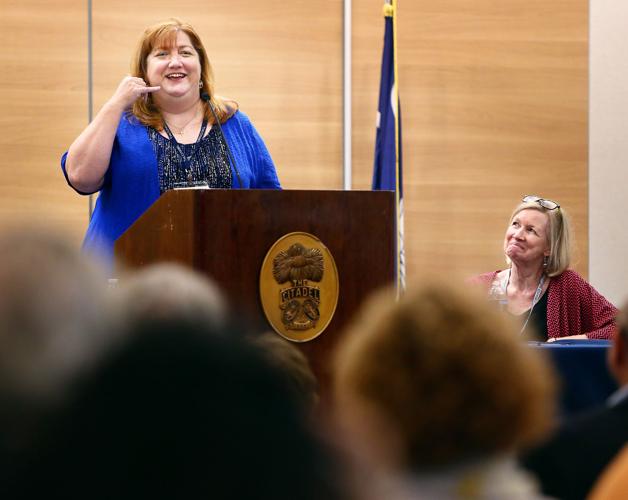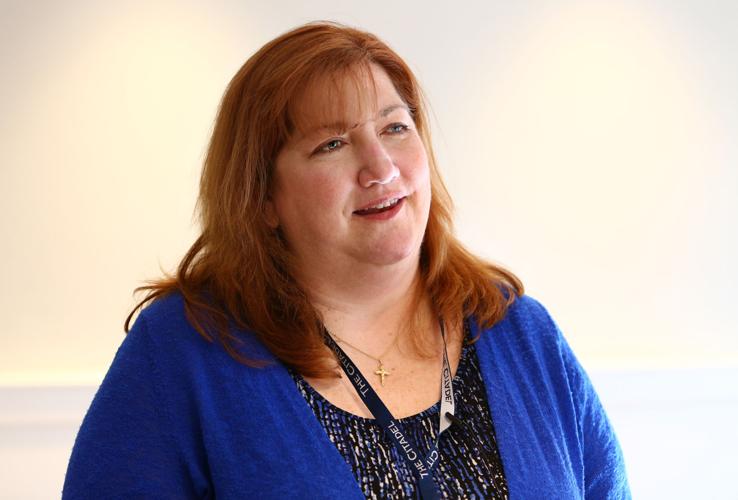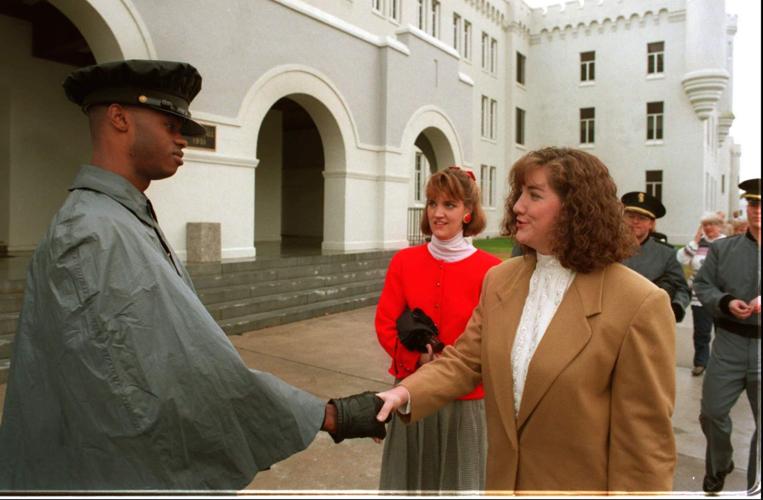When Shannon Faulkner arrived at The Citadel in August 1995, she was met with protest and outcry as the first woman trying to enter the Corps of Cadets, breaking its 152-year-old tradition of transforming 18-year-olds into "whole men."
But when she returned to campus Saturday to make her first invited public appearance at the school she had long hoped would be her alma mater — just one day after the 25th anniversary of her infamous lawsuit challenging the school's male-only admissions policy — she was greeted with fanfare and applause.
"The expectations of this weekend were nonexistent for me because I really, truly had no clue which way it was gonna go," she said. "It's been a pleasant surprise. It's been very positive."
Faulkner, now an English teacher in Greenville, spoke at a symposium on the life and legacy of the late South Carolina novelist Pat Conroy, alongside Conroy's widow, writer Cassandra King.
As one of his last requests, Conroy, a friend and mentor of Faulkner, wanted her to "make peace" with The Citadel. Faulkner said she's finally reconciled with the institution that decades ago wanted nothing to do with her.
An honors student from Powdersville, Faulkner was admitted to The Citadel in 1993, a week after her 18th birthday. Her acceptance letter was addressed to "Mr. Shannon Richey Faulkner." When college officials discovered she was a woman, they revoked admission.
Faulkner waged a two-year legal battle against The Citadel, a fight that subjected her to cruel attacks. Citadel supporters sold T-shirts and bumper stickers emblazoned with slogans like “Save the Males” and “1,952 Bulldogs and One Bitch.”
She started at The Citadel as its first day student on her 19th birthday, Jan. 20, 1994, taking classes alongside cadets under a federal court injunction. She became a member of the Corps a year and a half later. She didn't last long.
Overcome by stress — and, she said, the mess hall Beefaroni she had for lunch — Faulkner spent most of her first week as a cadet at the infirmary. She withdrew six days after her historic enrollment and left in tears while some cadets openly cheered and celebrated.
The next year, The Citadel’s Board of Visitors eliminated its males-only admissions rule after a U.S. Supreme Court ruling that the Virginia Military Institute — another all-male, state-supported military college — must admit women or refuse public money. Four women were admitted that fall, including Nancy Mace, who would become The Citadel's first female graduate.
Faulkner admitted she made "some mistakes" during her two-year ordeal but has no regrets. To her critics who believe Faulkner was "the wrong person" to force change at The Citadel, she asked, "Who else would have stood up?"
"If it hadn't been for me, (then) Nancy Mace and Petra (Lovetinska Seipel) and the other two young ladies who joined them that year after me, wouldn't have been invited in," she said.
She said she also wants to set the record straight: Her experience at The Citadel wasn't marred by other cadets or school officials. She blames the barrage of hostility she faced from "outside forces," including Citadel alumni and residents of Charleston, for her eventual departure from the Corps.
"I enjoyed being a member of The Citadel family. I do consider myself a Citadel alumni," she said. "This is my school as much as anybody else's. I won’t talk badly about the school and what it represents because I believe in it."
Her two-year fight for a place at the school took a physical and psychological toll. Her childhood home was vandalized. She received threatening and disparaging mail. She said a vandal wrote "Die Shannon" on The Citadel water tower.
Toward the end, Faulkner said a man in Greenville grabbed her and "basically told me that if I showed up (at The Citadel), my parents would die." The same man who threatened her family later resurfaced in Charleston.
"At one point in time, I thought I was going to die. I thought I was going to be the one that was going to be taken out, and I was willing to make that sacrifice," she said. "But when it came to my friends and my family, they should not pay for my choices and that’s what I had to decide."
At the end of Faulkner's panel Saturday, a dozen members from the audience lined up to take photos with her and shake her hand. Sumerlyn Carruthers, a 21-year-old junior at The Citadel from Fort Mill, was one of them.
Faulkner hugged her. With tears in her eyes, Carruthers said, "Thank you so much."
"Without her," Carruthers said, "I wouldn't be here today."









